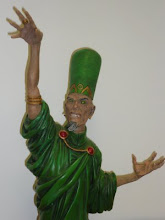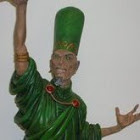 An slightly uneven anthology collection, the extremely strong stories outweigh the less successful entries.
An slightly uneven anthology collection, the extremely strong stories outweigh the less successful entries.Beepo and Roadkill feature in six episodes and all have the same problem, the rather aimless generalised anger and rage with everything and everybody that drives the stories is just too geralised and unstructured to hit the any target with force. As Roadkill notes the effort required to be outrageous increases greatly and effectively shocking anyone is getting more and more difficult. This essentially backs the stories into a corner that they fail to emerge from. They have funny moments, Beepo and Roadkill never engage with anything so everything they do is just so theatrical that it lacks any impact. The art is great, it is energetic and forceful, the best parts of the stories are all visual, the sheer energy of the pages and the layouts is extraordinary.
Henderson Saves Face, when Henderson is insulted in a incident in a office car park he exacts a wildly over the top revenge on his co-worker. A two page story that is stretched at that length and without any impact or actual force. There is a sort of joke lurking very far within the excess, it might have been funny at much shorter length, or it may simply to be too slight to have survived any treatment at all.
The Salt Lake City Avengers and No Justice, No League, are two superhero parodies that are worth reading only for the concentrated venom that Jason Yungbluth has for the genre. Most parodies have their roots in affection, it is very different to read ones that arise solely from bile.
Waiting for Planetary-a comic tragedy in 15 panels, plays off Waiting for Godot and works ok if you have some sense of the play.
A Peanut Scorned (inks by Emil Novak & Gerry Coffey) is a fantatsic slice of science fiction noir that uses the cast of Peanuts in a astonishing way. Happily no knowledge of Peanuts is required to enjoy this bleak and fierce story, in a post apocalyptic wasteland a man with a robot arm searches for his kidnapped girl friend. The story is not new, the context and drive is, the whole set up is just a dark joy. The art is powerful and gripping, the wasteland of the world is conveyed with telling detail and enormous physical solidity. The story provides a solid framework and focus for the rage and energy that moves through all the stories in the book, captured by a story that can really use it the energy animates the whole story. The cast all come strongly to life, the fierce struggle to survive in the wasteland rings true, the utter hostility of the environment is manifest in every line.
Clarissa is a sexually abused little girl who features in three stories, two long and one a single page. Clarissia is introduced in a single page story that does not quite come off, the punch from the last panel does not balance well against the rest of the page. Re-reading the story makes it much more effective as the knowledge is vital to understand the set up, the punch line then gets the necessary weight.
The two longer stories are pretty much flawless horror stories that are very nearly unbearable to read. The restrained art and tone of the stories allow the content to come forth without any obstacle. They are low key masterpieces of despair and hopelessness that grip the reader pull them in without mercy. The absnce of graphic detail is creates the room for the reader to fill in the spaces and to complete the context and events themselves. Clarissa is not sympathetic or pathetic, she is simply vulnerable and watching her be preyed upon is wrenching.
Jason Yungbluth is a significantly talented comic artist and writer when he has a strong story to deliver, in this volume there is more than enough of that talent on display to make it worth reading. It is a very bitter brew and a welcome reminder of the power of comics in the hands of talent.


No comments:
Post a Comment